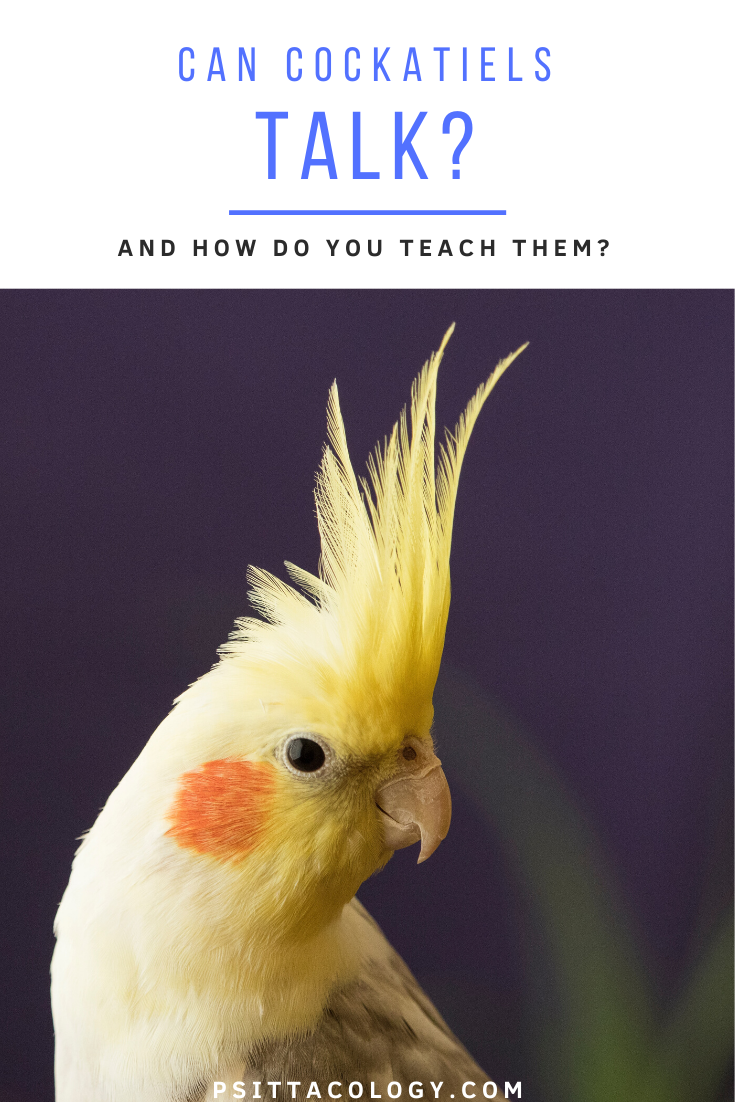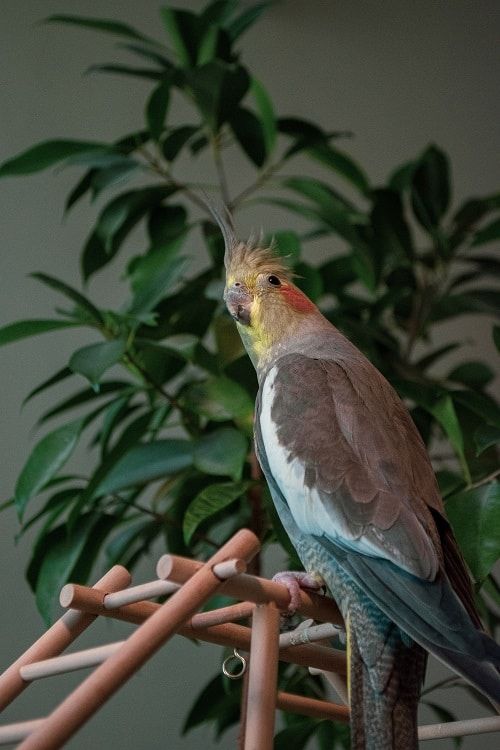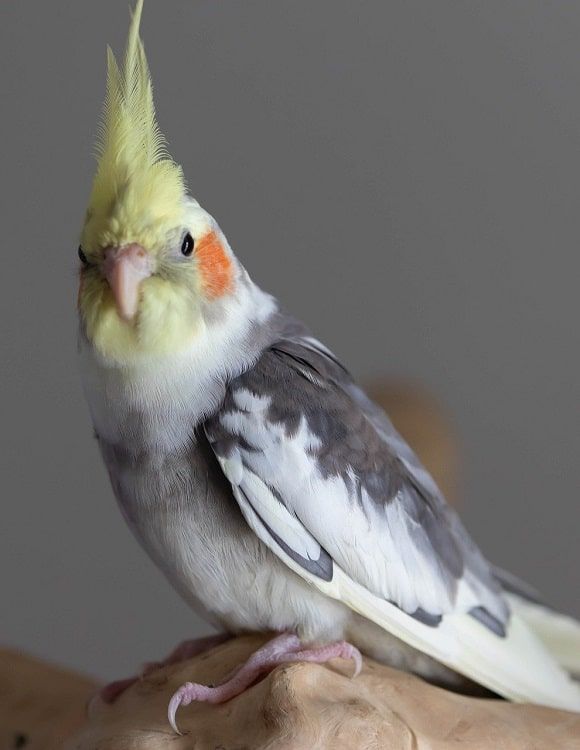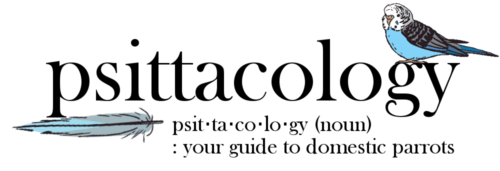Arguably the most fun aspect of many domestic parrots is their ability to mimic sounds. Many species can learn to imitate phrases and tunes to some degree; some talking parrots actually have amazing voices and memories. So what about the second most popular pet parrot species: can cockatiels talk?
Find out everything about how well cockatiels can talk and how to start teaching your own ‘tiel some words and songs.
Can cockatiels talk?
Short answer: yes, they can!
Long answer: yes, they can, but… how well they imitate noises and whether your cockatiel will even learn to do so at all depends on a number of factors.
You’ll also have to keep in mind that they’re no African grey or budgie; their voices are pretty raspy and very long phrases are not going to work. Simple tunes and words can be taught, though how well your cockatiel picks them up depends on the following:
- Gender. Naturally, male cockatiels are the ones that produce more intricate sounds. They do so as a flirting method to woo the ladies, which in turn vocalize less and mostly produce flock calls. As such, if any cockatiel is going to learn to speak, it’s going to be a male.
- Age. As with humans, cockatiels and other birds will pick anything up quicker when they’re still young. While older ‘tiels can learn to speak, it’ll be much easier to train a younger bird.
- Upbringing. A hand-raised cockatiel will be more accepting of training, as it’s more people-oriented and more likely to see you as a member of its flock. Again, it is possible to teach a cockatiel that wasn’t hand-raised to speak, but you’ll likely find it takes longer.
- You. Your own motivation and the amount of time you’re willing to spend with your bird obviously have a lot of influence on whether your cockatiel will learn to speak and whistle or not.
You need to keep in mind that this is a process: it won’t happen right away and some birds just never pick it up at all. Daily practice is a must, especially at first, and you can’t lose your patience.

How to teach a cockatiel to talk
If you’ve never taught phrases or tunes to a bird before, the tips below should be helpful. Put your patience hat on and start practising with your ‘tiel(s)!
Make sure your bird is healthy and comfortable with your presence before commencing training.
Pick your phrases
When picking a phrase or song you’d like to teach your cockatiel, keep in mind that it has to be short. They’re not well-suited to long and complicated speeches.
Things like “hi-hi!” when you approach the cage and “bye-bye” when you leave work well, as do simple things like “hi bird”, “pretty bird” or the cockatiel’s name. High-pitched phrases are the easiest.
If you’d like to go for a tune, make sure it’s not too complicated. Take “if you’re happy and you know it” for example: just a few different notes that you can easily whistle to your bird or leave on repeat. Do make sure that it’s not too annoying as you’ll be hearing it a lot!
Whistling is easier for a bird than talking, so it might pick up tunes more quickly than words.
Tip: Remember that your cockatiel won’t be able to remember many different songs and phrases, so don’t confuse it too much! If you do it might stop saying some of them entirely or start creating its own remixes with its personal favorites.

Training
The absolute key to getting your cockatiels talking is repetition. And by repetition, I mean repetition until you feel like your own head is going to explode! You should be chatting and whistling to your cockatiel whenever you’re around the cage, just to get the bird used to your voice.
Since your cockatiel is likely happy to see you, especially if you bring food and treats, it will learn to associate your voice and the phrases you chose with happy times. This is called positive association and it’s the ideal way to go when teaching birds anything. They won’t respond to negative reinforcement or punishment when learning tricks.
In addition to talking to your ‘tiel all day every day, take it out of its cage for 10-15 minute talking/training sessions one or multiple times a day. Sit down, speak to the bird in a clear voice and give it some head scratches. If it picks up any part of what you’re saying, be sure to reward immediately with a tasty treat! Then continue.
If your bird really doesn’t seem to be picking up a certain phrase, it might not like it or have trouble saying it. Try switching to something easier.
Things to try
Gently bobbing the bird up and down or side to side while it’s perched on your hand, and speaking to it at the same time, totally does it for some individuals. Similarly, some cockatiels love singing to something, and not always something that makes sense.
Yours might love serenading your foot, a crumpled tissue or a piece of food. Or, you know, it might need a piece of spinach on its head to get into the singing mood. Just some stuff to try!
Tip: You can record yourself saying your favorite phrases and play the recording to your bird throughout the day. There are also YouTube videos specifically for teaching parrots to talk. Do keep in mind that personal interaction is much more effective since it has that positive association aspect.

Examples of cockatiels talking
The videos below are two examples of cockatiels that learned to speak or whistle.
Note that all the phrases and tunes are short but sweet. The birds’ pronunciations are far from human-like, but they sure try their best!
If you have any more questions about cockatiels talking or would like to share your own experiences with getting your bird(s) to talk, don’t hesitate to leave a comment below!

We found an organic cockatiel breeder, I got to meet both parents! I was given 60 pages of instructions for caring for a tiel to prepare while our baby was with his mom. Our bird was used to handling. At 4 months, we would cup “Jerry” btw our palms gently & repeat his name. That’s when he started talking. MAN did he talk! He laughed like we do, & his shoulders going up & down. He made up phrases like, “You think that’s funny?”, that always got Everyone laughing!! He also learned words from TV. Jerry knew over 50 words & 10 songs. His faves: “Love Jerry, RIGHT NOW! “, repeating, Jerry, Jerry..18 times, until he ran out of breath!! He made up songs & we repeated, but it was important to let Jerry have the longest song, (for his self esteem). Lots of contact time & play, running water always got him going!!
Never let them near tea tree. He is missed every day. Still have his bedroom/ cage! Good luck & healthy birds!
That is so sweet, thanks for sharing! That’s a great vocabulary for a ‘tiel, mine only know “Tequila” and they completely mess it up every time! 🙂
Should your cockatiel fall ill, send it to the vet. instead of giving it Parrot-cetamol.
I concur. 😂